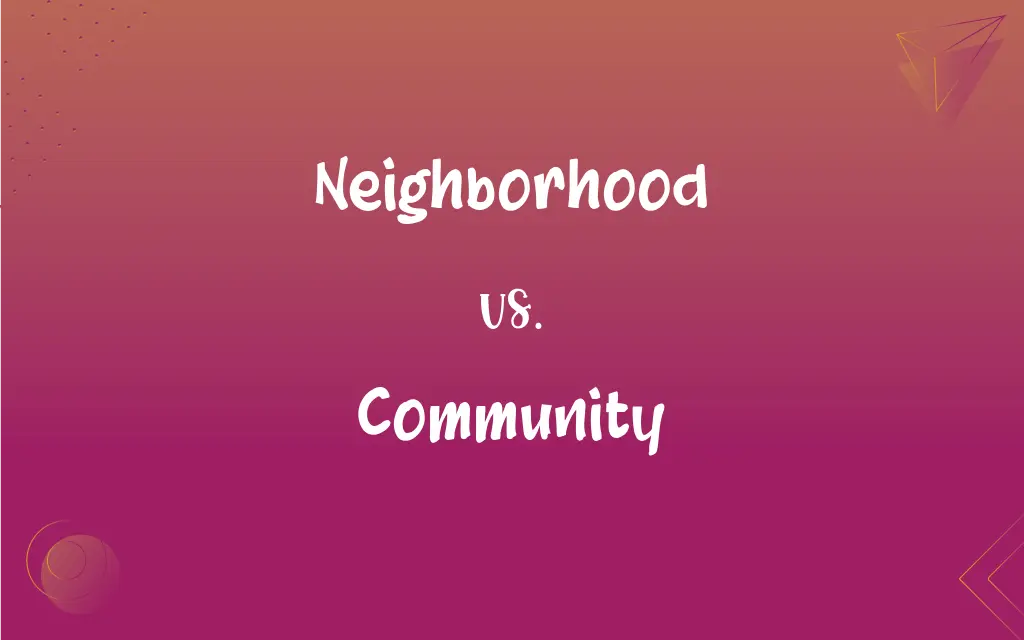Neighborhood vs. Community: What's the Difference?
Edited by Janet White || By Harlon Moss || Published on December 20, 2023
Neighborhood refers to a distinct geographical area within a larger city or town, while community is a broader term encompassing people sharing common interests or characteristics, not necessarily linked to a specific location.

Key Differences
A neighborhood is typically defined as a specific, localized area within a town or city, characterized by its geographical boundaries. A community, however, extends beyond physical locations, encompassing a group of people with shared interests, values, or identity, regardless of their physical proximity.
Neighborhoods are often defined by distinct physical features or landmarks and can be a part of larger urban or suburban areas. Communities can be formed based on shared interests, beliefs, or goals, and their members can be spread across different neighborhoods or even cities.
In a neighborhood, the interaction among residents is often due to their physical closeness, leading to shared local experiences and concerns. A community, by contrast, might form around shared experiences or interests, like an online community of artists, transcending geographical boundaries.
The concept of a neighborhood often includes elements like local shops, parks, and schools that serve the residential area. Communities might engage in activities or discussions in various locations or platforms, driven by their common interests rather than a shared local environment.
Neighborhoods typically play a crucial role in local governance and urban planning, influencing things like zoning and public services. Communities, while they can influence local or even global issues, are often more focused on shared goals, support systems, or advocacy related to their common interests.
ADVERTISEMENT
Comparison Chart
Definition
A geographically localized area within a larger city or town.
A group of people sharing common interests, values, or characteristics.
Basis of Formation
Geographical proximity.
Shared interests, values, or goals.
Interaction Among Members
Often due to physical closeness.
Can be physical or virtual, based on shared interests.
Role in Urban Planning
Influences local governance and urban development.
More focused on shared goals and interests than physical location.
Examples
Residential blocks, urban districts.
Online forums, cultural groups, professional associations.
ADVERTISEMENT
Neighborhood and Community Definitions
Neighborhood
A district or community within a town or city.
She loved walking her dog around the quiet neighborhood.
Community
A feeling of fellowship with others, as a result of sharing common attitudes, interests, and goals.
There's a strong sense of community among the local artists.
Neighborhood
A geographically localized area within a city or town.
Their neighborhood was known for its historic architecture.
Community
The condition of sharing or having certain attitudes and interests in common.
The environmental community rallied together for the beach cleanup.
Neighborhood
A residential area forming part of a city.
The new playground became a popular spot in the neighborhood.
Community
A group of people living in the same place or having a particular characteristic in common.
The community of small business owners held a monthly meeting.
Neighborhood
An area surrounding a particular place, person, or object.
The neighborhood around the school is very family-friendly.
Community
A group of people with a common interest or identity, often living together.
The online gaming community was a supportive space for gamers.
Neighborhood
A district, especially one forming a community within a town or city.
The neighborhood council organized a local clean-up day.
Community
A body of nations or states unified by common interests.
The international community came together to address climate change.
Neighborhood
A district or area with distinctive characteristics
A neighborhood of fine homes.
A working-class neighborhood.
Community
A group of people living in the same locality and under the same government.
Neighborhood
The people who live near one another or in a particular district or area
The noise upset the entire neighborhood.
Community
The district or locality in which such a group lives.
FAQs
What is a neighborhood?
A neighborhood is a specific geographical area within a city or town, characterized by social interactions and shared spaces among its residents.
Can a neighborhood have its own culture?
Yes, neighborhoods often develop their own unique cultures, influenced by the residents and local traditions.
Do neighborhoods change over time?
Neighborhoods can evolve due to economic, social, and demographic changes, altering their character and identity.
What role do schools play in a neighborhood?
Schools are central to a neighborhood, often influencing family choices and contributing to community engagement.
What is the role of leadership in a community?
Effective leadership helps to organize, guide, and nurture a community, ensuring that its members' needs and goals are met.
How does a neighborhood differ from a city?
A city is a larger area that encompasses many neighborhoods, each with its own distinct characteristics and communities.
What makes a neighborhood safe?
Safety in a neighborhood is typically related to low crime rates, community engagement, and effective local governance.
How important is location in defining a neighborhood?
Location is crucial as it determines the neighborhood's accessibility, amenities, and often its socio-economic status.
How does one choose a good neighborhood to live in?
This depends on personal preferences, including safety, amenities, schools, community vibe, and affordability.
What defines a community?
A community is a group of people with common interests, characteristics, or goals, often sharing a geographical location or a virtual space.
How do shared values shape a community?
Shared values are the foundation of a community, creating a sense of belonging and guiding collective actions.
Can a person belong to multiple communities?
Yes, individuals often belong to various communities based on different interests, locations, or social groups.
What challenges can communities face?
Communities may face challenges like internal conflicts, external threats, resource limitations, and adapting to change.
How do communities impact individual identities?
Being part of a community can significantly influence a person's identity, values, and social interactions.
Can a neighborhood affect property values?
Yes, the characteristics and reputation of a neighborhood can significantly impact property values within it.
Can businesses be part of a neighborhood?
Yes, local businesses are integral to neighborhoods, providing services and contributing to the local economy and culture.
How is a community different from a society?
A society is a larger group that can encompass multiple communities, with broader social structures and institutions.
What is the importance of communication in a community?
Effective communication is essential for maintaining relationships, resolving conflicts, and facilitating decision-making in a community.
Can a community exist online?
Yes, online communities are formed around shared interests or activities, without geographical constraints.
How do communities contribute to societal change?
Communities can drive societal change by mobilizing for social causes, influencing policies, and fostering innovation.
About Author
Written by
Harlon MossHarlon is a seasoned quality moderator and accomplished content writer for Difference Wiki. An alumnus of the prestigious University of California, he earned his degree in Computer Science. Leveraging his academic background, Harlon brings a meticulous and informed perspective to his work, ensuring content accuracy and excellence.
Edited by
Janet WhiteJanet White has been an esteemed writer and blogger for Difference Wiki. Holding a Master's degree in Science and Medical Journalism from the prestigious Boston University, she has consistently demonstrated her expertise and passion for her field. When she's not immersed in her work, Janet relishes her time exercising, delving into a good book, and cherishing moments with friends and family.






































































